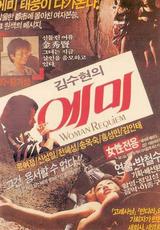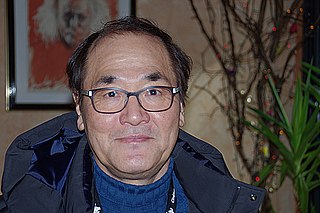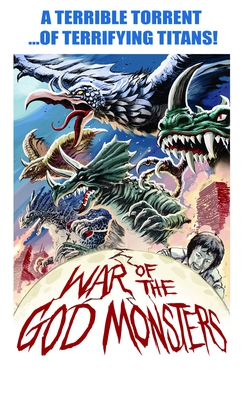
Busan, officially Busan Metropolitan City, is South Korea's second most populous city after Seoul, with a population of over 3.4 million inhabitants as of 2017. Formerly romanized as Pusan, it is the economic, cultural and educational center of southeastern South Korea, with its port being South Korea's busiest and the sixth-busiest in the world. The surrounding "Southeastern Maritime Industrial Region" is South Korea's largest industrial area. The large volumes of port traffic and urban population in excess of 1 million make Busan a Large-Port metropolis using the Southampton System of Port-City classification.
The following is an overview of events in 1985 in film, including the highest-grossing films, award ceremonies and festivals, a list of films released and notable births and deaths.

Naju is a city in South Jeolla Province, South Korea.
White night, White Night, or White Nights may refer to:

Pulgasari is a 1985 North Korean kaiju film directed by South Korean filmmaker Shin Sang-ok. It is based on the legend of Pulgasari, a metal-eating creature in Korean folklore, and is loosely based on the lost 1962 South Korean film of the same subject, Bulgasari. Shin directed the film under the orders of Kim Jong Il after being kidnapped in 1978 by North Korean intelligence. Pulgasari was the last of several films he made in North Korea before escaping to the United States in 1986.

Shin Sang-ok was a South Korean filmmaker with more than 100 producer and 70 director credits to his name. His best-known films were made in the 1950s and 60s, many of them collaborations with his wife Choi Eun-hee, when he was known as "The Prince of South Korean Cinema". He received posthumously the Gold Crown Cultural Medal, the country's top honor for an artist.
A secret is information kept hidden.

The cinema of North Korea began with the division of Korea and has been sustained since then by the ruling Kim dynasty. Kim Il-sung and his successor Kim Jong-il were both cinephiles and sought to produce propaganda films based on the Juche ideology.

Jung is a Latin alphabet rendition of the Korean family name "정", also often spelled Jeong, Chung, Joung or Jong. As of the South Korean census of 2015, there were 2,407,601 people by this name in South Korea or 4.84% of the population. The Korean family name "정" is mainly derived from three homophonous hanja. 鄭 (2,151,879), 丁 (243,803) and 程 (11,683). The rest of the homophonous hanjas include: 政 (139), 桯 (41), 定 (29), 正 (22) and 情 (5).
This is a list of films by year produced in the country of South Korea which came into existence officially in September 1948. The lists of Korean films are divided by period for political reasons. For earlier films of united Korea see List of Korean films of 1919–1948. For the films of North Korea see List of North Korean films. For an A-Z list of films see Category:Korean films.

Mother is a 1985 South Korean film directed by Park Chul-soo. It won several awards at the Grand Bell Awards, including Best Film.
Park Chul-soo was a South Korean film director, producer, screenwriter and occasional actor. He was one of the most active filmmakers in Korean cinema in the 1980s and '90s.
Kim Ji-mee is a South Korean actress, producer, and film planner whose activity began in 1957. She was born in Daedeok, South Chungcheong province, Korea in 1940. While a student of Deokseong Girls' High School, Kim was cast to Kim Ki-young's film, Hwanghon yeolcha (황혼열차) in 1957. Kim has been commonly dubbed "Elizabeth Taylor of Korea" by the South Korean news media for her resemblance with the American actress' appearance and popularity as well as her many marriages and divorces.
Hah Myung-joong is a South Korean actor, film director, producer, planner, and screenwriter. Hah started his career as an actor, but expanded his career to film directing, and film producing. Hah graduated from Kyung Hee University with a major in English literature. His brother Ha Gil-jong was a film director. His 1985 film Daengbyeot was entered into the 35th Berlin International Film Festival.

Dragonfly Squadron is a 1954 American war film directed by Lesley Selander and starring John Hodiak, Barbara Britton and Bruce Bennett. The film is set in the period shortly before and during the invasion of South Korea by North Korean troops.

Kim Soo-hyun, known as Soo Hyun or Claudia Kim, is a South Korean actress and model. She has appeared in Western films such as Avengers: Age of Ultron (2015), The Dark Tower (2017) and Fantastic Beasts: The Crimes of Grindelwald (2018), as well as Korean drama such as Queen of the Game (2006–2007) and Gyeongseong Creature (2023–present).
Events from the year 1985 in South Korea.

Bae Chang-ho is a South Korean director and screenwriter.
Ha is a Latin alphabet rendition of the Korean family name "하", also often spelled Hah or less commonly as Har. As of the South Korean census of 2000, there were 213,758 people by this name in South Korea, or roughly 0.5% of the population.

The Flying Monster is a 1984 Korean kaiju film directed by Kim Jeong-Yong.













